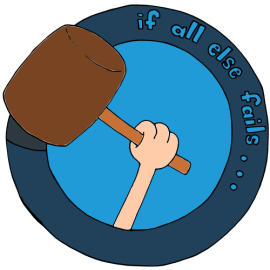Words are important. Since ancient times people have realised this.
In the Judeo-Christian tradition it is believed that God spoke creation into existence. From the ancient Jewish texts specifically grew Kabbalistic mysticism, which believed that the letters in the Hebrew alphabet had actual power to influence creation. The most well-known manifestation of this is in the golem-myth. Golems were creatures crafted from clay and, so the legend goes, brought to life by words inscribed on their foreheads. And did you know the standard incantation for stage magicians, “Abracadabra“, is derived from the Hebrew words meaning, “I create what I speak”?
In Japan there is the belief called Kotodama which teaches that mystical power dwells in words and names. And we can find similar beliefs in in the ancient Egyptian and Babylonian religions, as well as the more mystical branches of many modern-day religions.
The idea has also been used in fiction. In The Lord of the Rings, Treebeard cautions the hobbits, Merry and Pippin, that they should be careful to whom they tell their names, echoing the ancient belief that knowing your name gives someone control over you. In Terry Pratchett’s Discworld, some people are perturbed when a printing press using movable metal type is invented in The Truth, because the metal will remember the words. The character, Sam Vimes (The Fifth Elephant, Thud, Snuff) is at once despised and revered by the dwarfs because as child he was a blackboard monitor, one who destroyed words – an abomination to the dwarfs. And of course golems feature quite prominently in several of his novels. In the Doctor Who episode, The Shakespeare Code, an alien race manipulated Shakespeare into using the spoken word to help them open a portal to a different dimension. In Wilbur Smith’s Egyptian series, the eunuch, Taita, uses “words of power” when he conjures spells against his opponents.
Even if you don’t buy into the mysticism, you still have to admit that words are powerful. The biblical wisdom literature is full of admonitions that words have the power to create or destroy, depending on how they’re used. The book of James calls the tongue a “double-edged sword”. Through words you confess or reject religious belief. Through words relationships are started and terminated. No matter how impressive your CV, in the end you’ll get that job through words, at the interview. Actions might speak louder than words, but more wars have been started through a careless word than through hostile action, and no peace has ever been brokered without words.
Why all this philosophising about words? According to this article a new phenomenon is going viral in South Africa. Students from several universities have started “confession pages” on Facebook where members can submit anonymous confessions for publication on the page’s news feed. I’ve perused a few of the pages and many of the comments are about exams, or classes, or stuff that happens in residences. Some bemoan the fact that they have a crush on someone and don’t know how to proceed. Some are a bit racy, like the one that writes, “I’m just looking for a f__buddy.”
While a very novel idea, I wonder at the wisdom of creating a forum like this. Because I believe words matter, and that you should own them. If you feel something is important enough to say, you should say it openly, and stand by it even if people disagree with you. Why is this so important? It will make us think twice before we say something and make what we say more meaningful.
One need only visit an online forum or read the comments on a news website (don’t, by the way), and now these confessions pages, to see the type of things people will say online when they can be anonymous. People who would normally treat you with respect become insulting and crass hidden behind their online secret identity. The web is full of words breaking others down, supposedly in the name of freedom of speech.
What these people don’t realise is that those words they write matter. What they also don’t realise is that those words are permanent – the internet merely seems transient, but every word is stored somewhere on a hard drive. More important, those words are stored somewhere in someone else’s mind and heart. Words change people, for better and for worse.
It’s fine to disagree with someone. It’s fine to voice your opinions and defend them. It’s not fine to use the power of words to destroy another human being. All of us harbour dark, secret thoughts. Let them stay that way: secret. More often than not that’s better than revealing them. But if you feel you must speak, don’t do that in secret. Put your name by your words, and stand by them come hell or high water. Because words matter. And they last a very long time.

Hi there! I have nominated your blog for the Sunshine Award because I love your blog 🙂 There is no obligation whatsoever to accept but if you would like to accept and pass on this award please follow the link:
http://jaydeashe.wordpress.com/2013/05/31/sunshine-on-a-rainy-day/
LikeLike
Thanks so much. I was wondering what on earth I’ll write about today and you’ve just solved that for me. And now I start my day with a song in my head: You are my sunshine, my only sunshine…
LikeLike
You’re very welcome…although sorry about the song! That could get irritating 🙂
LikeLike
I’ll tell my wife the song’s in my head. Then she’ll start singing it and it transfers from me to her. One of my superpowers 😀
LikeLike
Awesome. I wish I had that superpower. 🙂
LikeLike